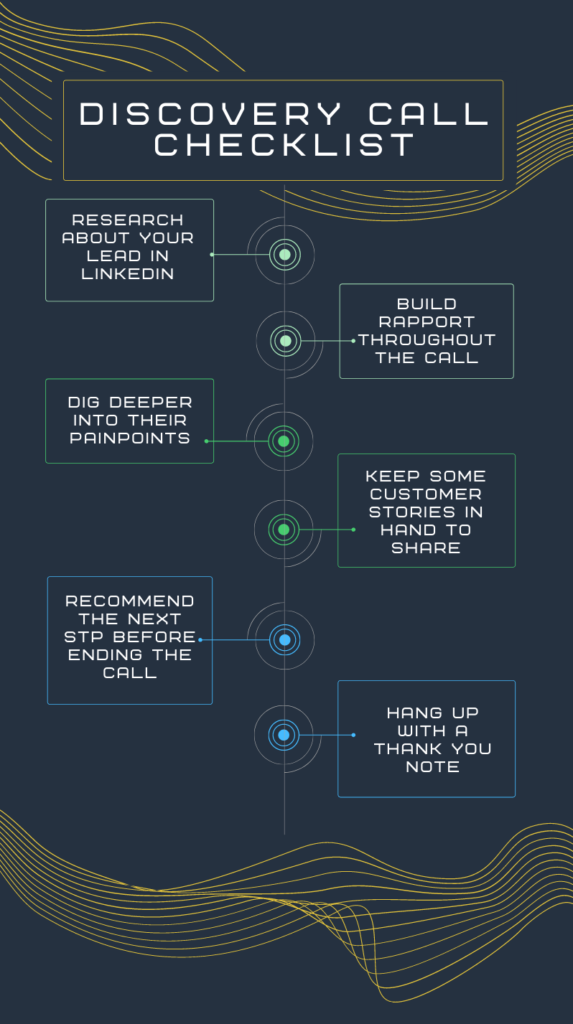Why Rafiki
Pricing


Pricing
Solutions

RevOps Leaders
Synchronize revenue generating functions

SDR Leaders
Get your team aligned and Coach your Reps 3x faster at scale

Sales Leaders
Unlock pipeline truth, drive confident forecasts

The discovery call is a sales rep's playfield. The success of a discovery call purely lies in the hands of a sales rep. The better the questions they ask, the better their discovery about prospects' requirements. Discovery calls can quickly escalate into a question-answer session. Good reps know how to extract information without giving prospects a feeling of being interrogated.
The most crucial part of closing a deal is convincing a client. A successful sale essentially involves a satisfied buyer and seller. While most of us know this, the vital question is - how to achieve it?
In other words, how do you proceed after a lead has shown interest in your product or service? Without proper navigation, all your efforts can go in vain.
That is where a discovery call comes in as your aid. This blog explains the different steps of converting prospects into opportunities with the help of a discovery call.
Here is the classic definition of a discovery call -
"Discovery call is the first conversation or meeting between a sales rep and a lead."
It acts as a bridge between the buyer and seller.
Without building a solid relationship and discovering prospects' pain points, a salesperson can not turn them into an opportunity. Mutual understanding between the seller and buyer is precisely the objective of any discovery call. The discovery call helps sales reps learn prospects' objectives and qualify if prospects are fit for a sale.
The discovery call is a sales rep's playfield. The success of a discovery call purely lies in the hands of a sales rep. The better the questions they ask, the better their discovery about prospects' requirements. Discovery calls can quickly escalate into a question-answer session. Good reps know how to extract information without giving prospects a feeling of being interrogated.

Preparation is the key to success. After scheduling the discovery call, as a sales rep, you must gather as much information as possible about the prospect. Don't ask everything on the call; it may frustrate the lead and even push them towards your competitors.
Now think of a situation where you are on a discovery call and get asked questions like -
There are high chances that the prospect will be frustrated, just like you, on hearing these questions.
To learn about the client’s professional life, use Linkedin. To explore their true personality outside work examine their Facebook or Instagram accounts. In case you still don't have enough information, you can always Google and find crucial information available on other platforms.
When you have accumulated enough information, you can limit the number of unwanted questions and talk only about what is relevant to the call. Leave an excellent first impression by letting your clients know that you have done your due diligence before getting on the call. A positive first impression is a powerful driver for your clients to purchase from you.
It's time to start the call! The primary purpose of this stage is to check whether the prospect can turn into an opportunity or not. In short, this is the time when you check for mutual fit.
For example, if you are a digital marketing agency specializing in Facebook ads, you can ask questions such as -
Answers to the above questions will help you find whether the prospect falls under your Ideal Customer Profile or not.
Here is a tip: Do not bombard them with all the questions in one go. Make the prospect answers one question at a time. While they answer each question, make sure you pay rapt attention and note down important points, if possible.
The prospect has reached your doorstep because they have a problem. However, there is a big challenge waiting for you here. Not every client is clear about their pain points. Some might even be unaware that they have difficulty in an existing process.
This is where you come up with some probing discovery questions like:
Listen to their answers carefully as the answers would drive strategy in the next step.
It is now time to stir up the prospects' problems and make them realize the seriousness of it. They must understand the gravity of the situation and the dire consequences they will face if they don't fix it with an optimal solution.
In short, show them the magnitude of their problems with some razor-sharp questions to trigger their curiosity or FOMO to find a solution.
Here are some questions you can lead with:
By this stage, your client should have made the decision to look for a solution to their problems. Unleash your product as the much-needed solution for their pain points.
You have to subtly unlock your offering's benefits and make them come up with more questions about your product. A typical sales discovery question at this stage could be
“If you have (the benefit/feature of your product), what change do you think can happen in your business?”
For example, if you own a Sales Outreach tool and one of your features is a repository of customized email templates, then the question should be
“If you have a repository of customized email templates, how much money can your business save?”
To such discovery call questions, you might want to add some additional lubricant to avoid friction. Yes, we are talking about social proof. Display testimonials, case studies, and data points to validate how the feature in question has already helped your other clients in the past.
That's it! You're about to hang up the call. Till now, you haven't manipulated or forced your customer to make a decision. Good job!
Now keep your recommendation simple -
"As a solution to you, I would recommend you to (do this)."
It can either be an invitation to the next call or demo or free trial signup - just drop the recommendation you think is most appropriate. If the customer is interested, they will take the next step. Don’t forget to thank the prospect for spending their valuable time with you before ending the call.
Without evaluation, how can you determine your success?
Without noticing your mistake, how can you improve your next discovery call?
That's where Rafiki comes into play. Rafiki is a revenue and conversation intelligence platform that offers you an excellent opportunity to organize and retrieve intelligible insights from your discovery call.
With Rafiki's state-of-the-art transcription, you can quickly analyze the performance of your conversations, the topic sequences that are most successful, and common mistakes that kill your deals. Apart from giving you automatic AI-generated notes sorted by topics discussed, Rafiki also offers one-click integration with popular CRMs, web conferencing applications, and dialers. All your conversations are centralized and easily searchable for you to unearth deal-winning insights in minutes, not days!
To know more about Rafiki and how it can help you streamline your customer-facing calls right from the discovery call up to your demo, contact us today.